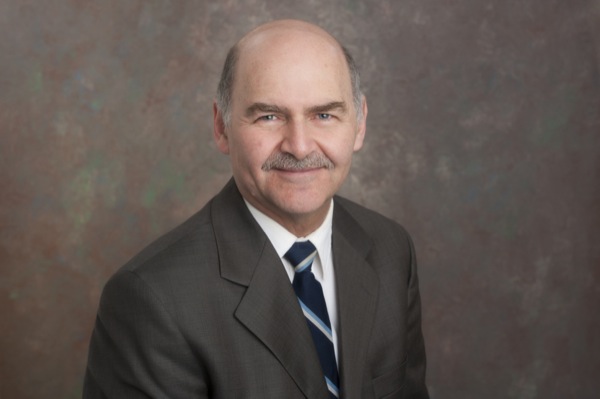Lenhoff selected for University’s highest faculty honor
11:52 a.m., May 13, 2014–Abraham Lenhoff, Allan P. Colburn Professor of Chemical and Biomolecular Engineering at the University of Delaware, has received the 2014 Francis Alison Faculty Award.
The award, the University’s highest competitive faculty honor, was established by the Board of Trustees in 1978 to recognize the faculty members who best demonstrate the combination of scholarship and teaching exemplified by the Rev. Francis Alison, founder of the institution that is now UD. The annual award also confers membership in the Francis Alison Society.
Lenhoff is internationally recognized for his expertise in applying the principles of thermodynamics, transport phenomena, biophysics and colloid science to protein separations and phase behavior, especially chromatography and crystallization.
“The main goal of our research is to analyze, control and exploit molecular interactions involving proteins and colloidal particles,” Lenhoff says. “The motivation is initially to obtain improved quantitative insights into existing processes, leading to more effective methods for designing and using them, but an auxiliary objective is to develop new products and operations.”
Lenhoff joined the University of Delaware faculty in 1984 and was named the Allan P. Colburn Professor of Chemical Engineering in 2010.
He is the principal investigator on a multimillion-dollar Center of Biomedical Research Excellence (COBRE) program funded by the National Institutes of Health since 2000.
The center’s research focuses on membrane protein production and characterization, a field of growing importance in biomolecular engineering research. The project has brought together the efforts of many researchers on campus and is building the core facilities needed for membrane protein production, structural biology and bioimaging research at UD and the Delaware Biotechnology Institute.
“One of the challenges facing higher education today is applying our scholarship in a way that has profound impact on the issues that demand our attention,” says UD Provost Domenico Grasso. “Bramie Lenhoff is conducting research in an area with tremendous implications for the treatment of human disease. At the same time, he has made significant contributions to teaching and service here at the University for the past three decades.”
Babatunde Ogunnaike, dean and William L. Friend Chaired Professor of Chemical Engineering, agrees.
“When nominating candidates for the Francis Alison Award,” he says, “I look for someone who has revolutionized his or her field, who has built strong and successful collaborations with colleagues, and who has successfully mentored undergraduate and graduate students along the way. These are the people who embody the spirit of Francis Alison, and Bramie Lenhoff has clearly demonstrated all of these characteristics consistently over an extended period of time here at UD.”
“Bramie Lenhoff epitomizes the qualities of an Alison Professor — a world class scholar, a dedicated teacher and mentor, and a model university citizen,” said Donald L. Sparks, S. Hallock du Pont Chair, director of the Delaware Environmental Institute and chair of the Francis Alison Society. “We are delighted to welcome him to the Francis Alison Society.”
According to T.W. Fraser Russell, Allan P. Colburn Professor Emeritus, Lenhoff’s research exemplifies the synergy of biochemical engineering, chemical engineering, and biophysics.
“His scholarship elucidates a new understanding of how protein solutions function and can be manipulated to enable and enhance biochemical engineering and bioprocess technologies,” he says. “His fundamental discoveries of biophysical knowledge facilitate broader applications in biomedical sciences.”
Lenhoff has served as chair of the Department of Chemical and Biomolecular Engineeringsince 2013. In this position, he is leading an initiative to document the first 100 years of the chemical engineering degree program at the University in a book due to be published shortly by UD Press (2014) that will serve as a foundation for building the next century of academic excellence in the department.
Lenhoff’s abilities in the classroom were recognized in 2009, when he was selected for an Excellence in Teaching Award. One former student noted that Lenhoff is “gifted at explaining difficult concepts in a simple manner.”
Another measure of his educational impact is that many of his former students have gone on to become faculty members at top universities and leading engineers in the biotechnology industry. He is also credited with serving as a teaching and research mentor to many early career faculty in the department.
The newest Alison Scholar’s research impact is evidenced by his citation-index statistics. He has more than 200 scientific publications with almost 7,000citations. His h-index of 46 places puts him among a very select group of scientists and engineers.
“Prof. Lenhoff has brought significant recognition and resources to help create one of the world’s premier biochemical engineering bioseparations research and teaching programs here at UD,” says Russell, who is also an Alison Scholar. “By doing so, he has greatly enriched both our academy, and through the many undergraduate, graduate and postdoctoral students and research professors he has mentored, the broader biochemical engineering community both academic and industrial.”
A list of previous recipients of the Francis Alison Award is available on this website.
Article by Diane Kukich
Photos by Evan Krape and Kathy F. Atkinson

